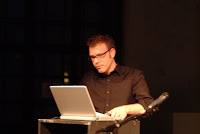I just noticed that I never posted the slides from my talk at the 2009 Conference on College Composition and Communication. So here is a pdf version of the slides.
Here is the abstract:
Since the earliest MUDs, MOOs and networked composition classrooms of the 1990s, composition teachers and scholars have been thinking, speaking, and writing about the impact of computers and later, Internet and Communication Technologies (ICTS) on composition. By the end of the 90s, there was little question that we must address this issue (Selfe 1999). By fall 2005, the Kairos CoverWeb identified three waves of technology users; even one of their own editorial team was a member of the third wave of users new to writing in virtual spaces. More than twenty years after computers first entered both writing classrooms and the disciplinary discourse, we must ask why this third wave represents people who are not just new to a particular technology, but to using computers or ICTs in the composition class in general?
The answer is both complex and simple. On the one hand, people encounter computers and ICTs in various ways throughout their education and professional life, and some may feel they are at best a necessary evil. Further, class, gender, age and other factors may have an impact. This is the complex answer. On the other hand, a quick survey of doctoral programs in composition and rhetoric around the country reveals that even now very few offer courses addressing computers and ICTs in composition and rhetoric. Of those few programs with these courses, only a very very few require them in the degree program.
Based on a more thorough survey of graduate programs in composition and rhetoric, I present trends in course topics, readings and structures. I further compare these trends to actual disciplinary trends to reveal how closely they are linked or not. I then discuss revisions to graduate curricula to better integrate study of computers and ICTs in composition and rhetoric, and argue that training all of our future faculty in these matters is crucial to both graduate and undergraduate instruction. Finally, I argue that the future of graduate pedagogy must involve more interdisciplinary awareness, particularly of scholarship about the cultural impact of computers and ICTs, and I draw connections to developments in new and comparative media studies, internet research, and technology studies that would enrich our understanding and our teaching.

